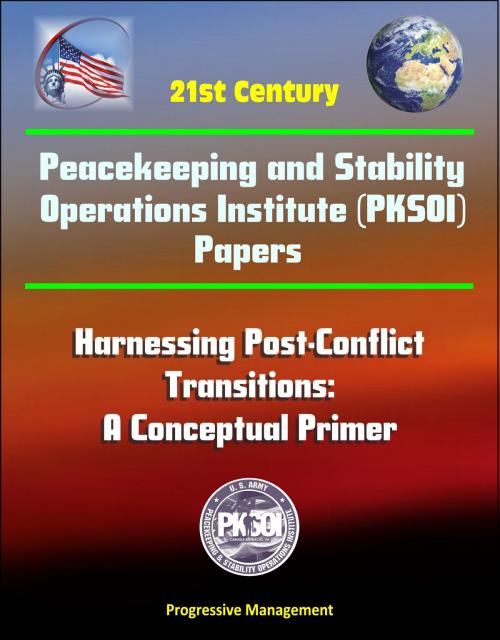21st Century Peacekeeping and Stability Operations Institute (PKSOI) Papers - Harnessing Post-Conflict Transitions: A Conceptual Primer
Nonfiction, History, Military, United States| Author: | Progressive Management | ISBN: | 9781310962486 |
| Publisher: | Progressive Management | Publication: | November 27, 2013 |
| Imprint: | Smashwords Edition | Language: | English |
| Author: | Progressive Management |
| ISBN: | 9781310962486 |
| Publisher: | Progressive Management |
| Publication: | November 27, 2013 |
| Imprint: | Smashwords Edition |
| Language: | English |
Today's security environment undoubtedly tests the boundaries of conventional international and military responses to persistent interstate conflict. New challenges are continuously emerging that pose vexing dilemmas and question the assumptions of actors engaged in post-conflict stability operations. Furthermore, recent experiences in Iraq and Afghanistan suggest that the often-indistinct concept of transition urgently requires a greater collective understanding by all actors participating in stability operations. As operations move toward a "clear, hold, build, transition" strategy, a widely accepted and understood definition is necessary to unite U.S. military, interagency, and multinational planners to foster greater collaboration and unity of effort. To evaluate transition strategies and make recommendations for future stability operations, researchers and policymakers require both a common understanding and way ahead for advancing the concept as a critical doctrinal and operational objective.
This monograph offers an unparalleled analysis on current research and available tools for transition in post-conflict situations. The authors make a significant contribution to the field by providing a broadly applicable definition of transition and a comprehensive assessment of the existing approaches and literature on the topic. Most importantly, their analysis lays the groundwork for future conceptual development and improved implementation of post-conflict transitions.
The Peacekeeping and Stability Operations Institute and the Strategic Studies Institute are pleased to offer this analysis as a leading article in helping to clarify, define, and advance transition as one of the most critical, but least understood, aspects of stability operations.
Since the end of the Cold War, members of the international community have undertaken more than 20 major operations to stabilize post-conflict societies, yielding mixed results. Stability operations are tremendously complex and demand successful direction of multiple, simultaneous transitions that range from transforming violent conflict to a sustainable, peaceful environment, to the process of forging sustainable governing institutions from fragile or nonexistent infrastructure. Yet, the very notion of transition eludes policymakers, professionals, and scholars because the concept lacks precise meaning, and its application varies according to context and conditions. At no other time has understanding transition been more critical, especially as "clear, hold, build, transition" becomes the dominant theme for ongoing operations in Iraq and Afghanistan. Together, professionals and academics share the challenge and opportunity to improve how the international community conducts stability operations — through the comprehensive understanding and implementation of transition.
Today's security environment undoubtedly tests the boundaries of conventional international and military responses to persistent interstate conflict. New challenges are continuously emerging that pose vexing dilemmas and question the assumptions of actors engaged in post-conflict stability operations. Furthermore, recent experiences in Iraq and Afghanistan suggest that the often-indistinct concept of transition urgently requires a greater collective understanding by all actors participating in stability operations. As operations move toward a "clear, hold, build, transition" strategy, a widely accepted and understood definition is necessary to unite U.S. military, interagency, and multinational planners to foster greater collaboration and unity of effort. To evaluate transition strategies and make recommendations for future stability operations, researchers and policymakers require both a common understanding and way ahead for advancing the concept as a critical doctrinal and operational objective.
This monograph offers an unparalleled analysis on current research and available tools for transition in post-conflict situations. The authors make a significant contribution to the field by providing a broadly applicable definition of transition and a comprehensive assessment of the existing approaches and literature on the topic. Most importantly, their analysis lays the groundwork for future conceptual development and improved implementation of post-conflict transitions.
The Peacekeeping and Stability Operations Institute and the Strategic Studies Institute are pleased to offer this analysis as a leading article in helping to clarify, define, and advance transition as one of the most critical, but least understood, aspects of stability operations.
Since the end of the Cold War, members of the international community have undertaken more than 20 major operations to stabilize post-conflict societies, yielding mixed results. Stability operations are tremendously complex and demand successful direction of multiple, simultaneous transitions that range from transforming violent conflict to a sustainable, peaceful environment, to the process of forging sustainable governing institutions from fragile or nonexistent infrastructure. Yet, the very notion of transition eludes policymakers, professionals, and scholars because the concept lacks precise meaning, and its application varies according to context and conditions. At no other time has understanding transition been more critical, especially as "clear, hold, build, transition" becomes the dominant theme for ongoing operations in Iraq and Afghanistan. Together, professionals and academics share the challenge and opportunity to improve how the international community conducts stability operations — through the comprehensive understanding and implementation of transition.















